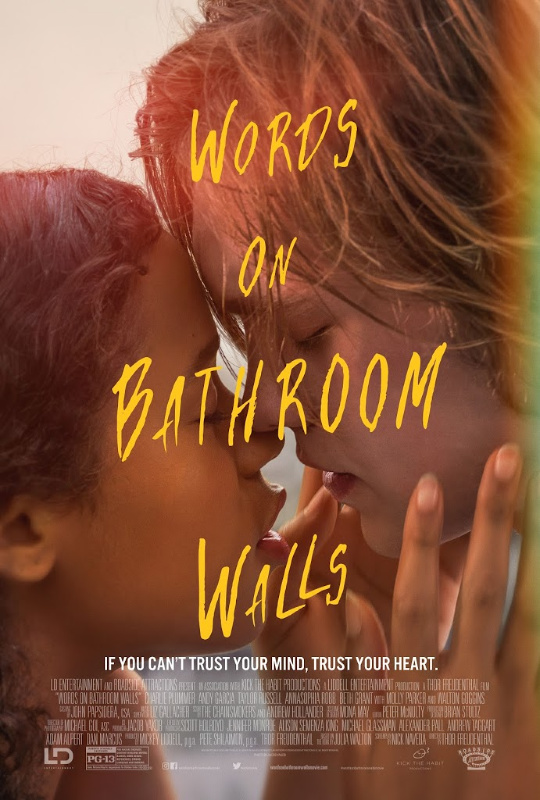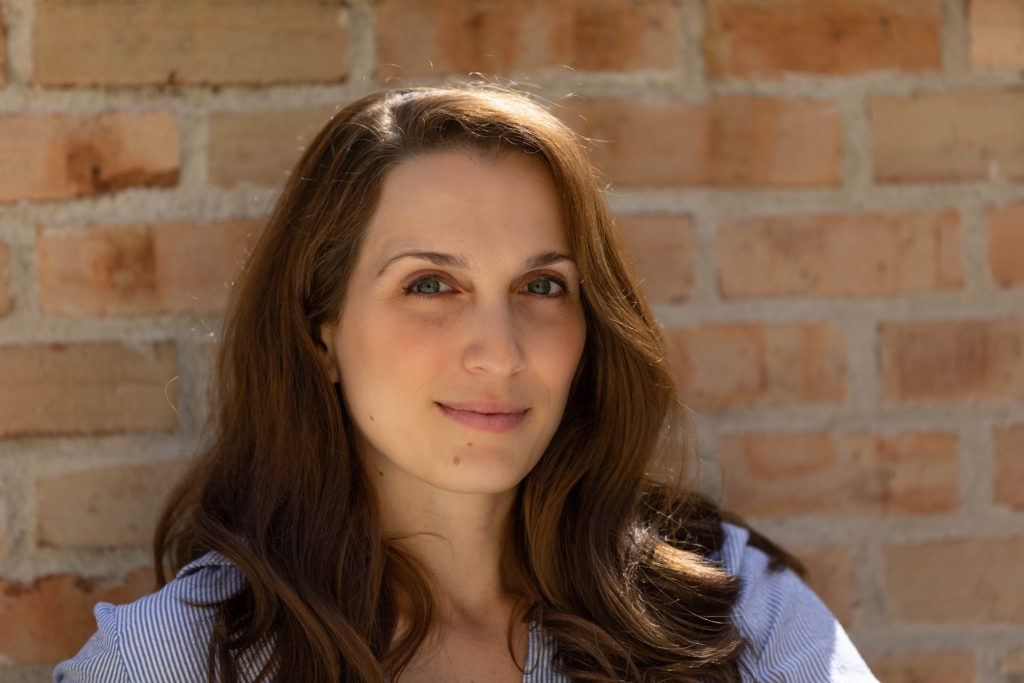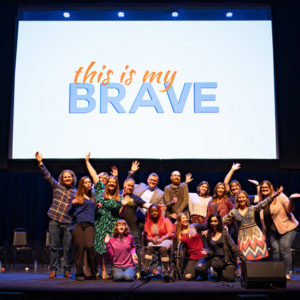Interview with author Julia Walton, Words on Bathroom Walls
Our This Is My Brave Teens Intern, Anastasia Vlasova, had the opportunity to interview author Julia Walton recently on her book – Words on Bathroom Walls – that inspired the new major motion picture with the same title releasing this summer.
WORDS ON BATHROOM WALLS tells the story of Adam (Charlie Plummer), who appears to be your typical young adult – a little unkempt with raging hormones and excited about a future pursuing his dream of becoming a chef. Expelled halfway through his senior year, Adam is diagnosed with a mental illness that he keeps a secret at his new school. Living in constant fear of being exposed, Adam finds a soulful, comforting connection in Maya (Taylor Russell), an outspoken and fiercely intelligent girl who inspires him to open his heart and not be defined by his condition. With the support of his newfound romance and his family, Adam is hopeful for the very first time that he can see the light, and together, triumph over the challenges that lie ahead.

Anastasia: What inspired you to write specifically about schizophrenia?
Julia: Okay, so, the way it worked out was I was in a job that I absolutely hated. I was stuck in a cubicle, checking policies for an insurance brokerage, and the first chapter of Words on Bathroom Walls was actually written at my desk out of pure frustration. After I wrote the first chapter and got the feel of Adam’s voice, I realized that the story was going to be about schizophrenia.That’s when I started doing the research too. I had completely finished the first chapter and then I realized “Oh, this is what we’re going to be talking about.” And that’s when I started diving into the research. So, it kind of was born out of my own frustration, but there’s really no explanation for why it was schizophrenia at that particular moment.
Anastasia: Have you ever experienced mental illness? If so, could you describe what you went through?
Julia: So, personally, it’s been anxiety…all my life. A lot of it was connected to school, but a lot of it was connected to everyday situations where you feel this immense pressure building in your chest. You feel like you’re moving too quickly and you’re almost trying to slow yourself down. Whenever I get tense, I kind of get stomach clenches. It’s just constant. It’s gotten better through breathing exercises, yoga, and just being more aware of how to deal with it. Anxiety is something that I’ve dealt with my whole life. My second book that comes out in December deals with anxiety and with another male protagonist that uses yoga as a way to kind of help his anxiety and help him work through issues.
Anastasia: What kind of research did you have to do while writing? Did you speak with people who have schizophrenia?
Julia: So, research-wise, I spent a lot of time in the library looking through medical journals and watching YouTube videos about people living with schizophrenia and recording their experiences. I had a beta reader who was schizophrenic and read the first draft and gave me feedback on certain scenes to make sure that they were realistic and made sense within the plot of the story. I also relied heavily on a handbook that I found in the library for people who had family members who were affected by mental illness, specifically schizophrenia, and ways that they could help. I thought that that could help inform some of the other characters in Adam’s life and how they would react and try to help. I thought that it was important to take a look at the family and friends and the people that are close to someone who is trying to deal with the mental illness, so they could also offer some help.

Anastasia: Do any of the characters in the story reflect real people in your life?
Julia: Yes. So, yeah, I mean it’s true – not all of it. I started with a seed of my personality and my husband’s personality, but they’re swapped. Like, a lot of Adam’s characteristics are mine and a lot of Maya’s personality traits are my husband’s. So, that’s what I started with when I started building the characters, just in the very beginning. There are a lot of things that are completely different from the way my husband and I interact, but there were a few things from the beginning that were 100% him and 100% me – like Adam’s baking. At the time I was baking nearly every other day for my husband’s office when I was writing the rough draft. As for my husband, there was a line in the book about him being a robot – I’m going to misquote it now haha – and about being direct and saying exactly what you mean in the moment that you mean it. That’s something that my husband has always believed in. So, those characteristics were completely woven in throughout. But, I think that was it. It was just a way for me to build their characters. There are still certain things that are not like us, but there are some characteristics that I’ll look at and go “Oh, yeah that’s me.”
Anastasia: Who is your favorite character in your book?
Julia: Oh, I can’t do that. I can’t pick. There are so many things I love about Adam and there are so many things that I love about Maya. I mean…yeah, I just can’t pick a favorite.
Anastasia: What are your favorite characteristics of Adam and Maya?
Julia: So, I love Maya’s directness and I love Adam’s creativity. I love that he uses the baking as an outlet when dealing with something that is outside of his control. He can control baking, though, and he can make things that he loves and he can make them for the people that he loves. In a way, that’s beautiful – that you can do something that matters to you when you’re struggling.
Anastasia: What drew you to the title Words on Bathroom Walls…were there alternative titles you considered?
Julia: There were some alternative titles. In the beginning, I played with the idea of using Feel or Real as two title options. Then there was the part in the movie where they panned over the words on the bathroom walls and it said, “Jesus loves you, but don’t be a homo.” That’s actually a line that I saw on a bathroom wall growing up. So, I used that as a conversation starter. The two lines were written by two different people and you could tell because the handwriting was different. I thought it was strange how the words could change, like a conversation between two people, and the meaning can change immediately based on how somebody else comments on it. It just seemed appropriate for the story. You’re viewing something by itself and the minute you start looking at the comments and the way that other people are viewing it, it changes. So, word on the bathroom walls is like an ongoing conversation.
Anastasia: What were some of the challenges you faced while writing this book? Did you experience writer’s block?
Julia: I didn’t have writer’s block for this story. I’ve had it for other stories, though. The first draft of this story felt so easy and natural – the story just flew out. But, I had a lot of self-doubt and a lot of “Is this good enough?” “ Am I making sure that I’m making this as real as possible, and giving these characters real problems and real personalities?” “Am I approaching it well and making sure that I’m honoring the character and the people that are actually going through this?” Those were the things that I dealt with. Anytime I wrote a scene that was emotional or difficult for Adam, I thought about somebody else looking at it and making sure that they felt like they were seen.
Anastasia: How did you deal with the emotional impact of your book on yourself while writing it?
Julia: While I was writing it, I approached it with an open heart trying to make sure that I was doing good. You know, putting good out into the world. I wanted for people to see Adam as Adam, not just as schizophrenia. And I wanted people to love him – to love somebody who is flawed and to see the beauty in those flaws.
Anastasia: What do you hope your readers will take away from this book?
Julia: I think the message from the book is the message that the film really does a good job of addressing: Adam is an amazing character on his own. He’s more than his mental illness. It’s a part of him and something that he always has to be aware of and deal with, but he’s so many more things than just that. I want other people to look beyond the mental illness when they look at someone, and look at the person because that’s the most important thing.

Interview and transcription by Anastasia Vlasova.
WATCH the trailer for Words on Bathroom Walls – in theaters this summer!
Follow #wordsonbathroomwallsmovie on: Facebook, Twitter and Instagram!

